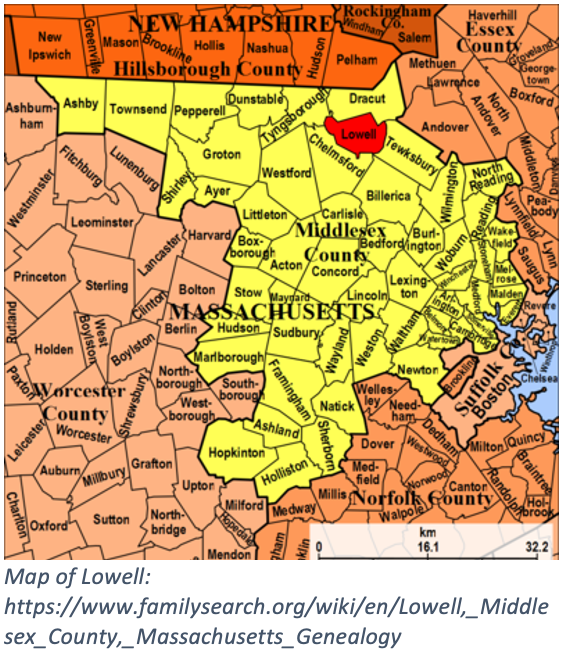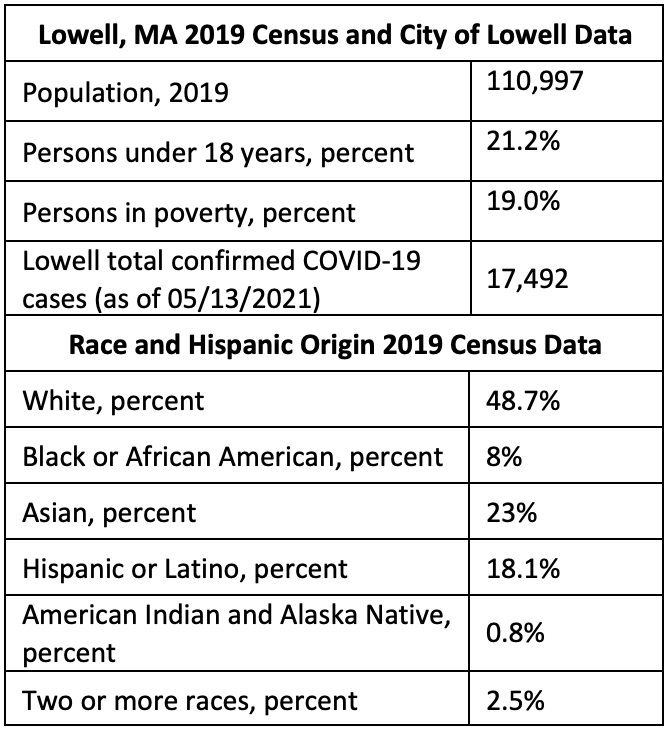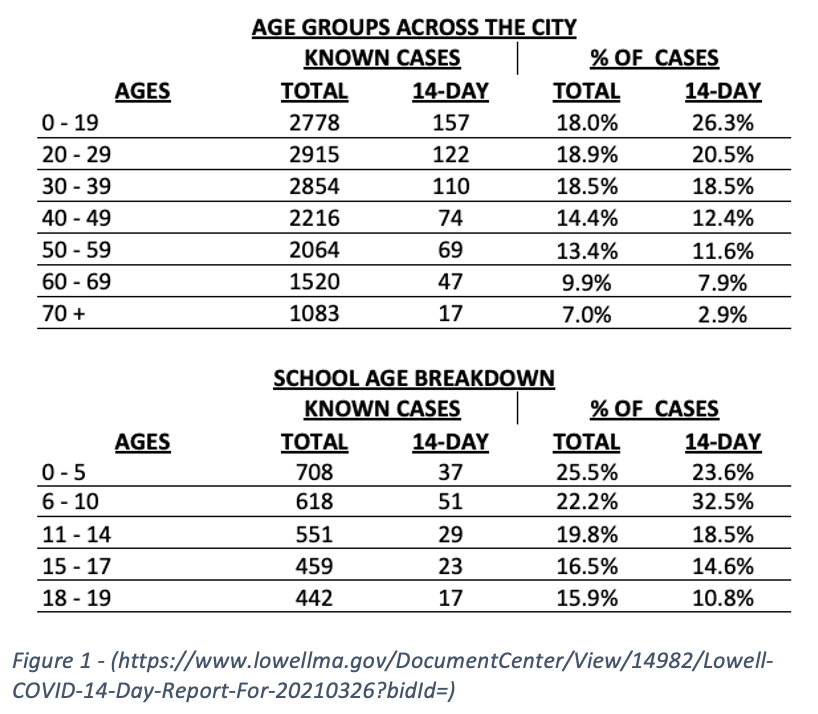Submitted by Hannah Lilly Burgess on
School Health is Priority Number One in Lowell Massachusetts
Lowell, Massachusetts At-a-Glance:
Lowell is a diverse city located north of Boston, near the New Hampshire border. With a population of almost 111,000, Lowell is also a large city. Lowell has a median resident age of 36 years, so it is mainly comprised of a younger working class. Lowell’s history is steeped in textile work, and it has worked to expand and diversify its opportunities in the education, technology, and healthcare industries. Despite this growth and allure drawing families to Lowell, 1/5th of Lowell residents live in poverty and many families face challenges, such as food affordability and internet accessibility in their homes.
Introduction of the Pandemic:
Like many cities with higher poverty rates, Lowell was harshly affected by the SARS-CoV-2 pandemic in March 2020. The safety of school communities became a priority for Lowell’s board of health, as roughly 21% of their population is under the age of 18. Unlike most MA school districts that hire school nurses directly, Lowell’s school nurses are employed by the health department and are assigned to different schools and school buildings accordingly. This distinction proved to be a major advantage for Lowell over this past year, as school nurses and the health department could work collaboratively to keep school communities safe.
Lowell’s school nurses are employed by the health department and are assigned to different schools and school buildings accordingly. This distinction proved to be a major advantage for Lowell over this past year, as school nurses and the health department could work collaboratively to keep school communities safe.
All about the Kids:
The primary concern of Lowell school nurses was, and remains, the health and safety of their students. Beth Moffett RN, BSN, NCSN, School Nurse Coordinator for Lowell Public Schools, describes how school nurses have worked tirelessly for the city and the schools over the last year to ensure that students and families were well supported throughout the pandemic.
Meal distribution sites were established across the city, so families of students could easily access food. School nurses provided support to community members who were isolated and needed guidance on how to receive food and medication. Lowell’s diverse population meant that language barriers were an additional challenge they faced when aiding the community. School nurses successfully utilized the “Language Line” to communicate effectively with community members of many cultures and varying native languages.
Since school nurses in Lowell are public health nurses, the pandemic also required them to take on new responsibilities to protect the city has a whole. When schools closed in March, they had to quickly transition from focusing on their school communities, to contact tracing for the whole city. Beth states that school nurses immediately returned to their public health roots. All the nurses were incredibly busy getting training on efficient contact tracing protocols and procedures, as well as learning about the importance and details of this new responsibility.
Importance of In-Person School:
Schools serve as a safe place for many students in Lowell. During a typical school year, there are some students with non-ideal situations at home that school nurses make a point each day to contact, even briefly. When the pandemic hit, leaders in Lowell understood the importance of trying to keep students in school, and of remaining connected to members of the school community.
The school nurses and the health department recognized the toll that extended isolation and remote learning has taken on the mental health and well-being of faculty, staff and students. School nurses understand how important socialization and being with peers is for students. They saw the stress that working parents were experiencing having their children remotely learning at home. Beth believes remote learning simply cannot provide the same level of education as in-person classes can, since students aren’t immersed in the learning environment.
Realizing the significance of social connections and in-person learning, the Lowell school nurses have been doing everything in their power to get their students back in school, including assuming a higher risk themselves by continuing to work in-person throughout the entire pandemic.
Return to School:
School nurses in Lowell have focused on improving the health of the overall community, and getting Lowell students back to school safely. They worked with local agencies and community partners to address food insecurities, access to COVID-19 testing, and vaccine eligibility. The school nurses assisted with the Lowell COVID-19 emergency operations center. Here they triaged COVID-19 symptoms, self-care, food insecurities, and when to seek medical advice. They also explained isolation and quarantine protocols, and travel orders. Many of the school nurses also continued to perform contact tracing for the health department through the summer of 2020, a time that school nurses usually have off.
In September, 3% of Lowell’s students returned to school, beginning with high-needs students (i.e., students with autism, English language learners, and students with emotional and behavioral concerns). Some of the school nurses were back in the school buildings conducting their usual school nurse duties, while also continuing to contact trace for the school and the city.
School nurses also took on the additional responsibility of conducting pooled testing. Beth mentions that pooled testing requires significant planning and collaboration. Multiple pooled testing rosters must be accurately developed, and, if a pool tests positive, school nurses must follow up by re-testing all the individuals within that positive pool to pinpoint the individual that was positive. This process requires managing student flow to prevent further exposure and donning full personal protective equipment (PPE) to conduct testing. Once the positive case in the pool has been identified, the school nurse then turns to contact tracing, allowing them to keep track of those who had close contact with the positive individual, both in and out of school. Lowell school nurses were especially attentive to and supportive of positively identified students, families, and staff members in their school communities. They helped guide them through the quarantine/isolation process and educated them on the timeline and requirements for being able to return to school.
Having school nurses that work directly within the health department has been beneficial to ensuring the safety of the Lowell community. When positive cases were identified within the city and the school district, the school nurses contacted members of their school communities and identified those who may have been close contacts. The school nurses assumed the responsibility of following COVID-19 positive patients throughout their 14-day quarantine to provide support and guidance. These connections allowed school nurses to actively monitor their school populations to ensure safety. The nurses know their school communities very well. They have established trusting relationships with students, families and staff, facilitating strong communication systems to effectively manage this crisis.
The New Year:
Starting in February 2021, Lowell brought 3% of their special needs population back to in-person learning. On March 1st another 25% of their student population (about 3,100 students) was brought back to in-person learning. On April 5, kindergarten through grade 5 students returned, and, on April 26, students in grades 6 through 12 returned. With more students in the school buildings, the school nurses hoped that their responsibilities would become a steady balance between providing an optimal learning environment for students and continuing their COVID-19 disease prevention strategies.
In Recent News:
Since Labor Day 2020, Lowell has experienced a continuous rise in COVID-19 cases. A recent 14-day report (April 2, 2021) showed the highest prevalence of new cases (26.3%) is among 0–19-year-olds. Of this group, 32.5% are children between the ages of 6 and 10. This is proving to be another challenge school nurses and the board of health in Lowell are facing as they identify contacts, determine causes of spread, and apply necessary control measures.
Beth mentions that her door, along with others at the Health Department, is always open for anything school nurses may need. This incredibly hardworking team will continue to persevere through these unprecedented times to ensure the health and safety of their school and city community.
As a result of the efforts of the school nurses tracing, teaching, and proficiency, Lowell is now experiencing a downturn in COVID-19 cases. Vaccine clinics began at Lowell High School for eligible students and are also open to family members. As of May 27th, 2021 the City of Lowell is in the Green on the Massachusetts Department of Public Health color-coding system, meaning less than an average of 10 new daily cases per 100,000 in the population.
Written by Hannah Burgess

 Facebook
Facebook X
X LinkedIn
LinkedIn Forward
Forward